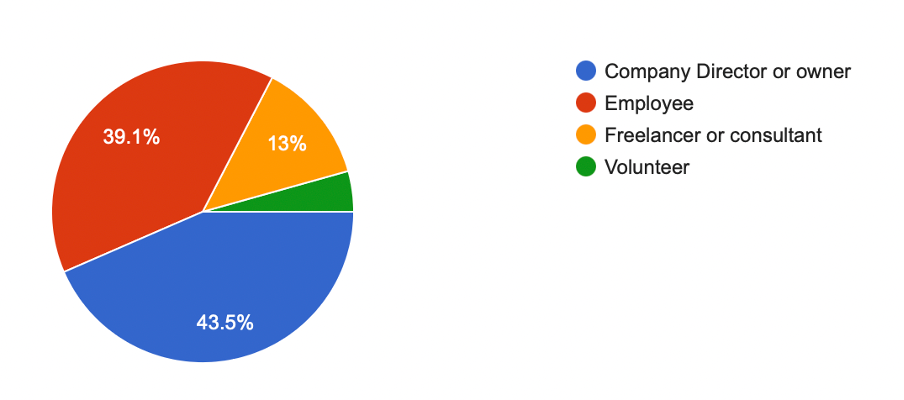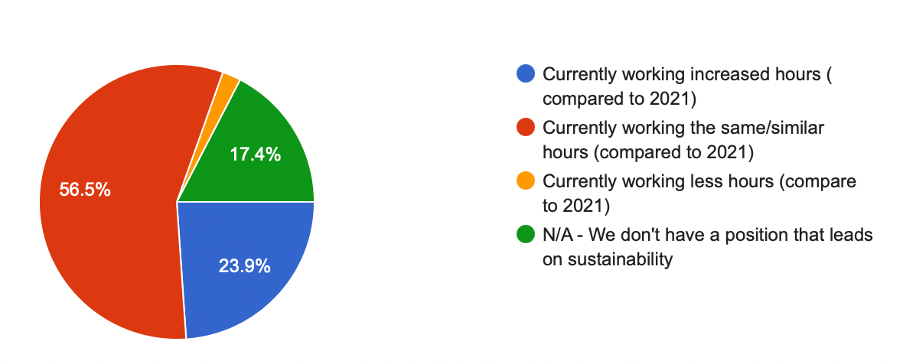In this 8th year of the annual Industry Green Survey, 119 festivals and events with a combined audience of over 2.1 million took part, from community events to the largest summer music events in the UK. Check out the results, including trends in practices and what event organisers are prioritising in 2023.
The survey is published by Vision: 2025. We acknowledge that this sample of events is likely more engaged with sustainability measures, and thus above average in terms of environmental practices; however, the answers nonetheless give us a valuable snapshot that will help inform our work over the next 12 months. Thanks to everyone who has given us their time.
Who filled out the survey?

Key findings
- Local authority expectations are changing: 17% of events reported that their local authority required information about sustainability in 2022, and a further 24% said it has been indicated that this will be required in the near future, suggesting that by 2023 some 41% of events may be required to provide information.
- The priority areas for event organisers have changed since the 2021 survey, with waste slipping off the top three, to be replaced by overall carbon footprinting. Despite this, only 24% have a net zero strategy in place and less than half (45%) are currently measuring their carbon footprint, less than in 2021!
- The use of grid connections is on the rise, with almost a quarter of events reporting that they are now using grid as part of their energy mix.
Event Organiser Priorities 2023
- Energy use
- Travel & transport
- Overall carbon emissions / audience comms
What’s new in 2022?
- 38% put new measures for recycling in place
- 37% used a programme, project or consultancy to help improve sustainability
- 28% employed a new environmental policy, action plan or public campaign
Investment in sustainability staff capacity within event companies
- 73% of participants said they have a sustainability-focused role in place (either full or part time)
- 17.4% or organisations don’t currently have a position with a remit that includes sustainability
- At organisations that have had a sustainability role in place since 2021 or earlier, 70% have maintained the same or similar hours and 30% have increased dedicated capacity

What are the most common sustainable actions that festivals are taking?
- Reusable cups at bars (80%)
- Waste strategy to increase recycling (78%)
- Monitoring fuel use (76%)
FOCUS ON KEY AREAS
Energy
The good news: The majority of events are now using LED festoon and monitoring generators. A third have now tried using battery units, up from 25% in 2021, and 23% are using a grid connection as part of their power mix.
The less good news: Less than half of events are receiving a detailed energy report post event or feel engaged enough with their provider to put in place a strategy to reduce fuel and increase efficiency.
Travel
Around half of events that responded have comprehensive travel services in place, such as shuttle busses, dedicated coaches, and secure cycle parking. Four out of five are communicating with audiences about travel choices, but only 50% are doing so with crew, and less than 40% with artists or suppliers. This makes sense, as audience make up the largest share of carbon emissions, and also provides clear areas for improvement. With travel representing 80% or more of a typical outdoor festival’s carbon footprint, there is an opportunity for more than half of festivals to implement similar changes and reduce emissions.
Waste
It’s clearly the norm to have recycling system front and back of house now (73% and 82% respectively), but perhaps the change since previous years is that now 74% have a reuse policy (for décor and production materials), showing how circular waste principle are being adopted. Also surprising is that 68% say they know what recycling plant their materials are going to.
What are event organisers finding hard to tackle?
- Travel stands out in the comments offered by survey respondents, with a range of questions relating to how to engage stakeholders to reduce emissions
- Working with traders on food sustainability
- Clarity on the sustainability of certain materials and waste processes
- Reusable cable ties are a challenge!
- Working with contractors to reduce plastic is a theme again this year.
Barriers / challenges
- Cost is still identified as an issue for implementing sustainable solutions (76%)
- Time/capacity within the organisation (52%)
- Difficulty engaging contractors / inability of suppliers to deliver (joint 34%)
Main drivers for taking climate action:
- Staff/internal commitment
- Audience expectations
- Artists
This is the first time that ‘artists’ has featured in the top three drivers for climate action, suggesting that the artists community are more engaged and advocating for change, perhaps a result of Music Declare Emergency’s activity in the sector.
What next?
Vision: 2025 use the survey to each year to inform support and resources for the industry. In 2022 we acted on three years of waste being identified as a priority, securing funding to set up an industry working group and research challenges and solutions to sustainable waste management – the Zero Waste Festivals Project with a report due to be published in February 2023. Additionally, we have responded to the rise in local authority requirement by establishing the Green Events Code.
Check out the Resources Hub, or get in touch to find out more.
This post originally appeared in our January 2023 Vision: 2025 newsletter. Sign up to receive monthly event sustainability news, case studies and guest blogs direct to your inbox.


